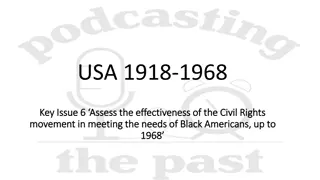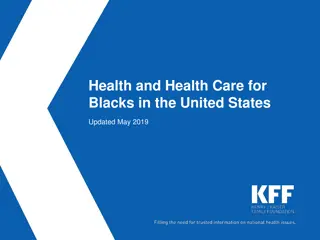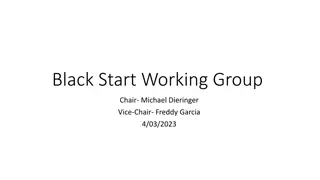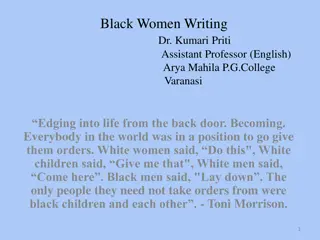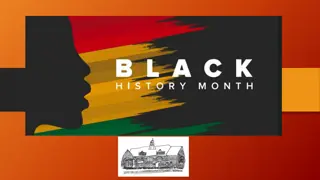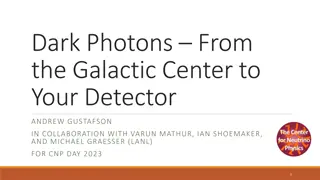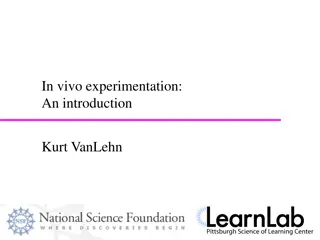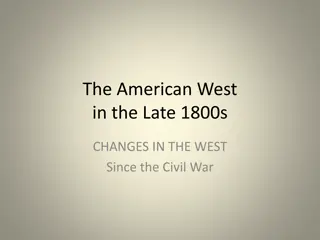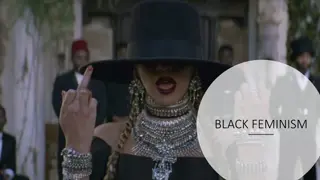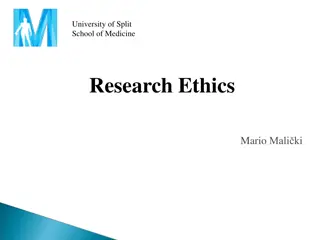Medical Apartheid: The Dark History of Medical Experimentation on Black Americans
Blacks in America have suffered from a dark history of medical abuse and exploitation, from being used as guinea pigs in colonial times to being subjects of unethical experiments like the Tuskegee Syphilis Study. Harriet A. Washington's book "Medical Apartheid" exposes the systemic racism and mistreatment that have fueled Black fear of medicine and contributed to disparities in healthcare access and outcomes.
Download Presentation

Please find below an Image/Link to download the presentation.
The content on the website is provided AS IS for your information and personal use only. It may not be sold, licensed, or shared on other websites without obtaining consent from the author. Download presentation by click this link. If you encounter any issues during the download, it is possible that the publisher has removed the file from their server.
E N D
Presentation Transcript
Medical Apartheid The Dark History of Medical Experimentation on Black Americans from Colonial Times to the Present By Harriet A. Washington
Across the board, whether were talking mental, physical, or sexual wellness, Blacks are falling behind. Medical abuse of Blacks by white institutions has created today s healthcare crisis: Blacks refusing medication, delaying and avoiding medical exams and critical medical research trials. A 2007 study in the American Journal of Law and Medicine estimated that only 1 percent of the nearly 20 million Americans enrolled in biomedical studies are black. The unwilling participation of Blacks in experiments of torture, abuse, and humiliation at the hands of doctors has led to Black iatrophobia a Latin term coined by Washington meaning fear of medicine.
Colonial period Owners would hire out or sell slaves to physicians for use as guinea pigs in medical experiments 19th century Black cadavers were routinely exploited for profit by whites who shipped them to medical schools for dissection and to museums and traveling shows for casual public display. Dr. Marion Sims, a 19th-century gynecological pioneer, was only able to achieve his breakthroughs by performing horrific surgeries without anesthesia on his female slaves. Early Accounts
1932 1972 Tuskegee Syphilis Study 600 syphilitic black men were left untreated by the U.S. Public Health Service so it could study the progression of the disease allowed to die untreated so that their cadavers could be used for research 1960s- early 1970s Radical brain surgery and lobotomies performed by a University of Mississippi neurosurgeon on African-American boys as young as six who were deemed aggressive or hyperactive a procedure he recommended for urban rioters after Watts Early 20th Century 1967 three neurosurgeons were awarded $600,000 by the National Institutes of Medical Health and the Law Enforcement Assistance Administration for brain research of urban rioters Reminiscent of Drapetomania theory during 1850s
Frederick Goodwin, chief of the Alcohol, Drug Abuse, and Mental Health Administration of the NIMH, compared inner city boys mostly black youth- to rhesus monkeys in the jungle, in an address to the National Health Advisory Council to champion the Violence Initiative, a group of urban violence studies. ''If you look, for example, at male monkeys, especially in the wild, roughly half of them survive to adulthood. The other half die by violence. That is the natural way of it for males, to knock each other off and, in fact, there are some interesting evolutionary implications of that because the same hyperaggressive monkeys who kill each other are also hypersexual, so they copulate more and therefore they reproduce more to offset the fact that half of them are dying. 1992 Now, one could say that if some of the loss of social structure in this society, and particularly within the high-impact inner-city areas, has removed some of the civilizing evolutionary things that we have built up and that maybe it isn`t just the careless use of the word when people call certain areas of certain cities jungles, that we may have gone back to what might be more natural, without all of the social controls that we have imposed upon ourselves as a civilization over thousands of years in our own evolution.
Discussion Questions (groups of 3-4 people) 1. What racist ideas carried through from colonial times to the 1990s research we read about in the excerpts? What racist ideas are still present today in our research? 2. How have these distant and more recent displays of racist assumptions in research shaped our society and us as individuals? 3. What are the overt and subconscious things we do in the culture of medicine and medical education that prevent black and brown people from feeling welcome and/or climbing the leadership ladder?




